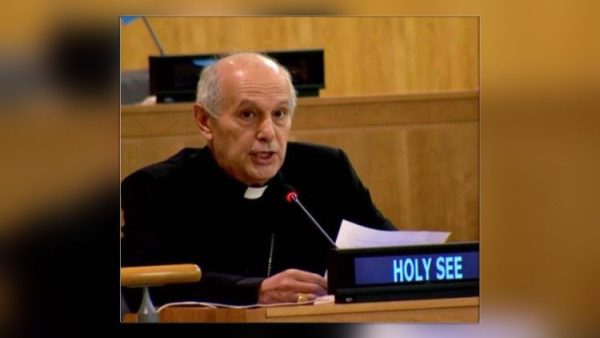Holy See Permanent Observer decries increasing violence against women
 The Holy See's Permanent Observer to the UN in New York addresses the Security Council debating what has been achieved ahead of the 25th anniversary of Resolution 1325 on women, peace, and security. He underscores how the representation of women in peace processes has gone down, while violence against women has increased.
The Holy See's Permanent Observer to the UN in New York addresses the Security Council debating what has been achieved ahead of the 25th anniversary of Resolution 1325 on women, peace, and security. He underscores how the representation of women in peace processes has gone down, while violence against women has increased.
The UN's work in the area of women, peace and security “cannot be successfully implemented unless the primary drivers that contribute to the worsening circumstances of women and girls,” such as wars, extremism and resources diverted to arms spending are addressed. Archbishop Gabriele Caccia, Permanent Observer of the Holy See to the Security Council itself, underscored this point in his address during the Open Debate on “Women and peace and security: Towards the 25th anniversary of resolution 1325 (2000).”
Archbishop Caccia recalled that "over the past few years, violence—including sexual violence—against women and girls has increased, while women’s representation in peace processes has declined, demonstrating that the current approach is falling short."
Resolution 1325
Approved unanimously by the UN Security Council on 31 October 2000, Resolution 1325 is the first ever measure to explicitly mention the impact of war on women and their contribution to conflict resolution for lasting peace. The Resolution sets four goals: to recognize the vital role of women in conflict prevention and resolution, to provide for their greater participation in peacekeeping and national security processes, to adopt a "gender perspective," and to train staff on women's rights.
Respect of human rights
As the 25th anniversary of Resolution 1325 approaches, Archbishop Caccia said "it is both timely and appropriate that we reassess how best to address the unique needs of women in conflict and their important role in its prevention and resolution."
The permanent observer then recalled the words of Pope Francis in his January address to the Diplomatic Corps accredited to the Holy See: “'When human rights are fully recognized for all, women can offer their unique contribution to the life of society and to be the first allies of peace.' Despite this, the Pope observed that, 'in many countries, women are considered second-class citizens', facing violence, abuse and limited access to education, employment, healthcare and other basic necessities. The Holy See condemns such treatment and deplores the situation faced by many women and girls, who are systematically denied the benefit of education."
Women for peace
The Holy See's Permanent Observer also recalled that in Pope Francis' recent apostolic journey to the Democratic Republic of Congo and to South Sudan, he emphasized the potential of women in transforming violent societies into peaceful ones when women "are protected, respected, valued and honored." To unleash this potential, according to Archbishop Caccia, the UN Security Council "must ensure that women, especially 'mothers who know how life is generated and safeguarded,' receive opportunities to participate more fully in peace processes and in all facets of 'political life and decision-making processes.'"
He also noted that the primary factors contributing to the worsening conditions for women and girls, "include not only conflict—such as the abhorrent war in Ukraine and oft-forgotten conflicts in Africa and the Middle East, but also extremism and the diversion of ever more resources towards arms expenditures, including for nuclear weapons, whose effects disproportionately impact women and girls."
Alessandro Di Bussolo
Source: vaticannews.va

